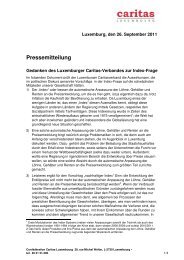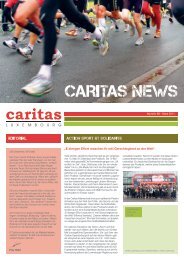Sozialalmanach - Caritas Luxembourg
Sozialalmanach - Caritas Luxembourg
Sozialalmanach - Caritas Luxembourg
Create successful ePaper yourself
Turn your PDF publications into a flip-book with our unique Google optimized e-Paper software.
moving away from the breadwinner/caregiver model to a dual-earner norm. Moreover,<br />
most welfare reform endeavours have remained deeply embedded in normative notions<br />
of equity and solidarity, shared cognitive understandings of the efficiency-enhancing<br />
effects of well-designed social and labour market policies. And while many reforms were<br />
unpopular, it is important to highlight that a fair amount occurred with the consent of<br />
parties in opposition, trade unions and employer organizations.<br />
5. Conjecturing Regime Change under Low Growth Prospects<br />
In democratic systems, it is ultimately politics that decides over matters of social and<br />
economic governance. Once again, the current economic crisis is fundamentally redrawing<br />
the boundaries between states and markets, calling into question many issues of economic<br />
policy, ranging from central banking, fiscal policy, financial regulation, global trade, welfare<br />
provision, economic governance and assumptions about human behaviour and rationality.<br />
Many observers, experts, and policymakers are seeking new answers, and looking for<br />
solutions to the new questions posed by the crisis.<br />
Thus far, intellectual and policy attention has focused on immediate crisis management,<br />
especially with respect to financial sector risk management. Little systematic thinking has<br />
been devoted to the question of whether and to what extent the crisis creates momentum for<br />
more fundamental welfare regime change. To be sure, it is still too soon to draw conclusions<br />
about the future economic, social, cultural, and political consequences of this momentous<br />
economic shock. On the other hand, these questions are among the most politically and<br />
intellectually pressing of our times.<br />
Any tentative exploration of these questions has to start with a diagnosis of the crisis.<br />
Does the current credit crunch bear any similarity to the Great Depression or is it<br />
more similar to the 1980s crisis of stagflation? The current downturn was triggered by a<br />
financial crisis, not by a ‘real’ economy crisis, and in this regard, it is more similar to the<br />
Great Depression than to the 1970s crisis of stagflation. Barry Eichengreen and Kevin H.<br />
O’Rourke 32 have concluded that today’s crisis is surely as bad as the Great Depression.<br />
In 2008, industrial production, trade, and stock markets plummeted even faster than in<br />
1929-30. However, whereas after the 1929 crash, the world economy continued to shrink<br />
for three successive years, in the wake of the 2007 crisis, policy responses were much better,<br />
and led to a swift upswing in trade and stock markets in the first half of 2009. This suggests<br />
that the biggest difference between this crisis and the one in the 1930s was timely, effective<br />
and coordinated crisis management to arrest economic collapse. Monetary expansion<br />
32 Eichengreen & O’Rourke (2009).<br />
161








